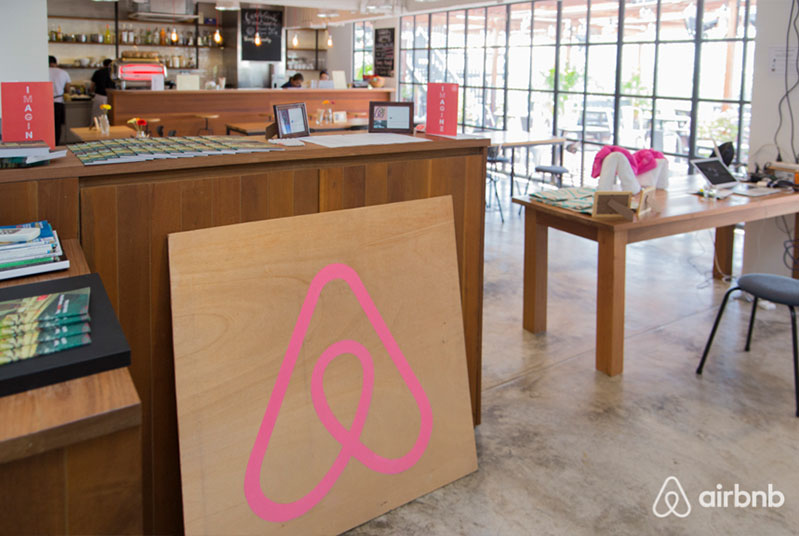We are here today for the battle of giants of accommodation services

Airbnb vs. Booking.com: pros & cons for the traveler. Source: shutterstock.com
We are here today for the battle of giants of accommodation services. If you have ever organized either an individual or a group trip, you are surely familiar with these two most popular platforms. Which of them is better for a traveler? It depends on your purpose, budget, and personal prerogatives. Without further delay, we get down to their comparison.
Overview

Booking.com is an aggregate service that allows you to make all travel arrangements on one website. It provides accommodation reservations, flight bookings, car rentals, and taxi transfers, guided tours, and tickets to places of interest.

Airbnb has similar functionality, offering numerous accommodation variants and organized activities, or tours provided by local hosts and experts.
Part of Booking Holdings Inc., Booking.com has more than 17,500 employees in 200+ offices in 70 countries worldwide. Their website and mobile apps are available in 43 languages, offer over 28 million listings, and covers more than 147 thousand destinations in 229 countries and territories worldwide.
Airbnb has over 150 million users worldwide. The platform offers them over 6 million listings in 81,000 cities and 191 countries of the world. On any given night, 2 million people are staying in Airbnb rentals across the world. Though the service shows more modest results compared to its main rival, it has been growing steadily over the last few years. The projected number of Airbnb users in Europe alone by 2020 is 24 million.
The difference in business scale is easily explained since Airbnb deals mainly with private properties while Booking.com cooperates with large hotel chains as well.
Features
The types of homes and accommodation found on both Booking.com and Airbnb range from hotels, apartments, and B&Bs to unique national dwelling places like Riads, Ryokans, yurts or igloos. Houseboats, campsites, and even private islands can be listed on these two platforms.
Both resources have special offers for business travelers. They usually provide high-speed WI-FI; flexible after-hours access; on-site laundry facilities; well-equipped work stations; and are close to city centers or public transport hubs.
Companies can sign up for Airbnb for Work for a free-to-use admin dashboard to plan trips for various employees and keep track of bookings. They can also organize team-building activities, rent brainstorming spaces for meetings, off-sites, etc. with this corporate feature.

Both resources have special offers for business travelers. Source: shutterstock.com
Booking offers free business solutions as well. This corporate travel management tool seamlessly integrates with the world’s largest online booking systems and travel management companies. The account owners also get access to better rates.
The filters on accommodation choices allow customers to narrow down the listings variety so that they fit their specific needs.
Both platforms are very flexible in selection options. For instance, Booking.com provides an opportunity to choose from those places to stay where you can charge your electric car. Airbnb allows checking whether the accommodation has a crib or a smoke detector, etc.
Payments & fees
Booking.com usually charges its customers on the spot providing plenty of free reservations and free cancellation opportunities. That means you pay upon arrival or departure depending on the host’s rules. Most hotels do not require an advance payment or deposit. If they do, you will find the details under ‘Hotel Policies’ on the hotel’s Booking.com page and in your confirmation email. Sometimes, a hotel’s representative will contact you directly to confirm your reservation and inform about their deposit policies.
However, the pricing and advertising principles of the company have been continuously criticized. The Competition and Markets Authority urged the main accommodation websites including Expedia, Booking.com, and Hotels.com to stop indulging in practices that give a false impression of a hotel’s popularity, with claims such as “one room left at this price” or “booked four times in the last 24 hours”. When thoroughly checked, these claims appeared false.
Over the last year, the company has been trying to bring its offers in accordance with the customer protection legislation. By the end of 2019, it reached an agreement with the EU to end “manipulative techniques” on its travel site, such as time-limits for making bookings and misrepresentation of discounts.
As for payment methods, the majority of hotels allow online or offline payments with various credit cards. Some also accept PayPal, Alipay, WeChat Pay, or cash.

As for payment methods, the majority of hotels allow online or offline payments with various credit cards. Source: shutterstock.com
Airbnb used to charge for 100% of the trip at the time of booking. In 2018, the platform introduced Pay Less Up Front option where guests paid for part of the trip at the time of booking – a 50% deposit in most cases – and paid the remainder closer to the check-in date. This payment option is available across all platforms: iOS, Android, mobile-web, and desktop. To qualify for Pay Less Up Front, the total stay must be $250 or more and be booked at least 14 days from the check-in date.
The resource also has an interesting payment alternative for group trips. The split payments feature puts the reservation in an “awaiting payment” state, with the organizer’s portion of the booking charged on their credit card while the host’s calendar is blocked. The organizer can hold a reservation for up to 72 hours, giving time for others in the group to log on to Airbnb and pay their portion. This option is truly exciting considering the survey results which revealed that 29% of American travelers have fought with a friend over group trip money collections, whereas 43% of respondents have lost $1,000 or more in group trip repayments.
The fee structure of this accommodation platform is a bit complex. When it comes to your final bill, it could be slightly more than what you originally saw advertised as the nightly rate. There’s often a guest fee added to your stay costs. Until 2019, Airbnb would charge all travelers a fee of up to 20% of the total cost, while hosts or property managers paid a commission fee ranging from 3 to 5% whenever someone booked one of their listings. Together, these guest and host commission fees made up a total Airbnb service fee about 23 to 25% of the total cost of a stay.
Beginning June 4, 2019, Airbnb requires any new hotel that joins the platform to pay a default 14% commission to Airbnb, with the exception of hotels located in Japan and China. All existing Airbnb hosts who started using Airbnb before that date, whether they’re professionals or just occasional Airbnb hosts, can keep using the old fee structure or agree to the new commission fee. That means travelers may no longer pay any guest fees when they book selected hotels and professionally-managed rentals on Airbnb.

Airbnb holds the guest’s payment for 24 hours after check-in. Source: flickr.com
As a protection for guests, Airbnb holds the guest’s payment for 24 hours after check-in before releasing the funds to the host. Once the host accepts your request, or if you book a reservation with Instant Book, your payment method will be charged for the entire amount at that time (except in the case of security deposits). However, the funds aren’t transferred immediately, they are blocked until the guest has arrived and agreed to stay at the given property.
Most major credit cards and prepaid credit cards (Visa, MasterCard, Amex, Discover, JCB), as well as many debit cards that can be processed as credit, are accepted. Depending on the country/region, certain additional payment options may be available. Specific platforms (like the iOS app or Android app) can also offer you a wider selection of payment methods. Specific payment means include Google Pay, PayPal, Apple Pay, AliPay, WeChat Pay, Aura, Hipercard, PayU, Sofort, iDEAL, Postepay, Elo.
Since Indian credit cards require two-factor authentication, guests in India are charged for the full cost of the reservation when submitting a request to book. If the host doesn’t accept your request or it expires, you’ll be refunded in full. Refunds can take up to 10 days depending on your bank. You’ll be charged for each booking request you submit, so if multiple booking requests for the same days are confirmed, you’ll be double-booked and you won’t be eligible for a refund.
Airbnb also has a referral program. You can invite your friends to Airbnb via email or by sharing your invite link on social media. Your friends will receive up to $63 off their first trip, and you’ll get $23 for every person who completes a qualifying stay and $11 for every person who goes on a qualifying experience. Your available credit will appear on the checkout page.
SEE ALSO:








